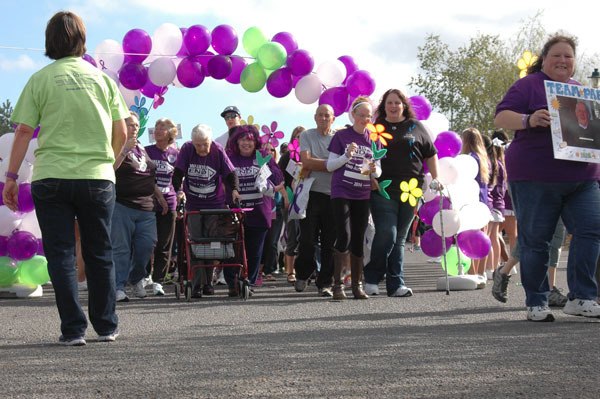Walk to End Alzheimer’s
When: 9:30 a.m. registration, 11 a.m. ceremony and 11:30 a.m. walk begins, Saturday, Sept. 26.
Where: Sequim Boys & Girls Club, 400 W. Fir St.
Cost: No registration, but every walker is asked to make a personal donation and commit to raising funds in the fight against Alzheimer’s.
More information: Visit www.alz.org/walk or contact event coordinator Laura Beausoleil at 206-529-3861.
by ALANA LINDEROTH
Sequim Gazette
An often isolating disease is being pulled from the shadows and into the light on Saturday, Sept. 26, as hundreds of individuals gather in support of the Alzheimer’s Association.
“This is one of the most horrific diseases because it robs us of our minds,” Sherry Niermann said. “When we lose our memory and our stories — we don’t know who we are anymore.”
Niermann is the captain of the team representing St. Luke’s Episcopal Church at the fourth annual North Olympic Peninsula Walk to End Alzheimer’s.
The walk is one of 16 the association is holding across the state and northern Idaho, but hosted at the Carroll C. Kendall Unit Boys & Girls Club in Sequim, it’s the sole walk on the Olympic Peninsula.
“The Sequim Walk is a very community-led effort and the Boys & Girls Club as a venue is unique,” Becca Verda, communications and outreach coordinator for the Alzheimer’s Association Washington Chapter, said. “There is a very family friendly atmosphere at the Sequim Walk — people bring their kids and entire families to come out and participate or volunteer so we really see the different generations within the community come together for the day around this cause.”
An anticipated 270 walkers from across the peninsula are expected to join in the 2.5-mile loop around central Sequim and help reach the $43,400 goal. As of Tuesday, the community already had reached 53 percent of the goal.
Alzheimer’s Association officials set the goal based on past walks and size of the community. Last year, the walk in Sequim raised more than $38,000.
When setting the goal, “we always try to challenge ourselves to go a little further,” Verda said.
All funds raised go toward the Alzheimer’s Association as a nonprofit to further the care, support and research efforts of the organization. Beyond enabling ongoing research in pursuit of a cure, the donations aid in providing free services such as a 24/7 helpline, workshops, support groups and online resources.
The monetary component is just one aspect of the annual event, however.
“It’s really an uplifting and fun day where everyone from caregivers to people living with dementia can be together in a large group,” Verda said. “When a large number of relatable people can come together, it’s always a powerful feeling.”
The energy and overwhelming sense of support is the driving force prompting Niermann to spearhead involvement in the walk for the second year, she said.
As she ages, Niermann explained how her exposure to more people, fellow congregation members and friends impacted by Alzheimer’s is seemingly increasing. Looking around at the walkers during last year’s event was a humbling experience for Niermann, as each registered walker can carry a “Promise Garden” flower of either blue, purple, orange or yellow in color. Each color represents a different connection to the disease, from a caregiver, someone who lost someone to the disease, someone with dementia or for those who simply support the cause and vision of a world without Alzheimer’s disease.
“It’s really amazing to look around and see all the people and the different flowers,” she said. “I absolutely believe it’s important that the community walks to raise awareness and show how important this is — I just think it can’t help but make a difference.”
Having known those that have lost loved ones to complications related to Alzheimer’s disease, Niermann has seen the hardship the disease can cause to not only the person with it, but the caregiver, too.
“Showing support for the caregivers is another reason to walk,” she said. “They’re incredible — what a statement of humanity.”
For each person with Alzheimer’s disease, there’s an associated average of three unpaid caregivers, Verda said.
“A lot of the time the caregivers are family members,” she said.
Alzheimer’s disease is the most common form of dementia, accounting for 60-80 percent of cases and ranks third in Washington as a leading cause of death, according to the Alzheimer’s Association. The form of dementia isn’t specific to old age, but up to 5 percent of people with the disease have early onset Alzheimer’s, which often appears among 40-50 year olds.
More than more than 100,000 Washingtonians have the disease, Verda said.
For more information on the association and/or Alzheimer’s disease, visit www.alz.org.
Reach Alana Linderoth at alinderoth@sequimgazette.com.



